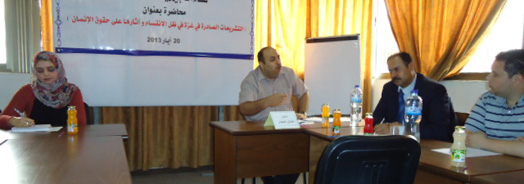Gaza-issued Legislation under the Internal Political Split: Impacts on Human Rights
On 20 May 2013, the Institute of Law (IoL) at Birzeit University organised at its Gaza Office a legal encounter on Gaza-issued Legislation under the Internal Political Split: Impacts on Human Rights.
The presentation was made by Dr. Adnan al Hajjar, Coordinator of the Technical Assistance and Advocacy Unit at the Gaza-based Al Mezan Centre for Human Rights. The legal encounter brought together representatives of human rights organisations, members of the legal community, and interested groups.
In her opening statement, Mrs. Lina at Tounisi, Coordinator of the IoL Gaza Office, welcomed the speaker and audience and made a briefing note about the IoL Legal Encountersprogramme.
Dr. Hajjar explained that the legislative policy is affected by concurrent political conditions. Legislative approaches differ from one political regime to another. Under authoritarian regimes, legislative policy does not allow a significant role to parliaments. The Executive plays a greaterrole in the legislative process. In the Gaza Strip, this has been the case following the internal Palestinian political divide. At the Palestinian Legislative Council (PLC), the Change and Reform Bloc has approved many laws, which arenow published in the Gaza-issued Official Gazette. Under such circumstances, the PLC provides– throughthe Change and Reform Bloc – legislation for the benefit of the Executive. In other words, the PLCproduces what the Executive needs in a legal framework.
Democracies accommodate political pluralism, independent political parties, and stable and effective civil society organisations. According to a well-established democratic legislative policy, enactments are an outcome of an interaction between social and political forces. Althoughone might outweigh another, all political actorsretain the power of influence. In this situation, legislation is a true reflection of social needs and legal standards. Laws are enacted to serve, not to adapt, the society.
Dr. Hajjar raised a question about the purpose of the many laws promulgating by the PLC through the Change and Reform Bloc under a dichotomy within the PLC itself. Regulations are passed in isolation from relevant stakeholders and civil society organisations, immediately impacting on the society from across the spectrum.
According to Dr. Hajjar, 30 laws have so far been passed by the Gaza-based PLC. These include the Civil Law, Tenant Law, Law on the Youth, Amended Penal Procedure Law, Law on Unions, Company Law, and Education Law. The Draft Penal Law is being developed and will be approved and promulgated. The latter is the most dangerous because it gravely impinges on human rights in the Palestinian society.
In the ensuing discussion, the audience made several interventions and recommendations. Most importantly, enforcement of regulations issued in the Gaza Strip should be suspended. By means of popular oversight and ballot boxes, all members of the society should be involved in the legislative process. They should be allowed to take part in a debate of the need and significance of enacted legislation. To ensure consistent and smooth law enforcement, experts and representatives of respective bodies and civil society groups will take part in the legislative decision-making process. Legislation should be predictable and enjoy consistent application. Otherwise, an uncoordinated legislative process will generate unexpected or undesired consequences. In fact, absent community participation allows enactment of laws that breach human rights.
The legal encounter was organised in partnership with the Konrad Adenauer Stiftung.











